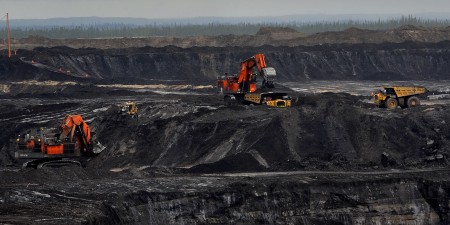May 7, 2015 – The election of the New Democrats (NDP), a socialist-leaning party, to lead the province of Alberta may have significant ramifications for Canada in its fight to reduce its carbon emissions. Alberta’s oil sands are the largest single emitter of greenhouse gases in the country.
What will a NDP government do is the question on the minds of many Albertans and Canadians. For spokespersons in the oil sands patch the win is “completely devastating” according to some. Why?
Because the incoming government has stated it intends to review oil and gas production in the province as well as rethink the strategy of exporting raw bitumen through oil pipelines. For Keystone XL and Northern Gateway, and even the proposed Energy East pipelines this may spell a change in climate. For environmentalists the NDP win is interpreted as the end for the pipelines. But no provincial premier just getting into elected office is going to pull the plug that quickly although Rachel Notley has stated she would stop promoting Keystone XL and Northern Gateway.
Instead the new premier intends to review revenue the province gets from the oil patch including royalties and the carbon tax. She wants private enterprise to build an in-province refining capacity. That’s not the same as turning off oil sands production and in-province refining may contribute additional sources of greenhouse gases.
The new government has also pledged to stop spending tax dollars to support carbon capture and sequestration (CCS) projects which right now is Alberta’s only playbook for reducing carbon. That leaves Saskatchewan’s Boundary Dam as the sole CCS site in the country.
The larger implications for the country have yet to be realized. The end of a 44-year Conservative dynasty in Alberta, a bastion of power for the federal Conservatives who form the current majority in Ottawa, may presage future results when the nation goes to the polls in the fall.
Canada has yet to announce how it intends to reduce its carbon footprint and the targeted rate of those reductions in anticipation of the meetings in Paris in December 2015. A “climate change” politically in Alberta could be the beginning of the end of “climate indifference” on the part of the federal Conservatives who may see in the provincial election a message from citizens even in the oil patch province to take climate change seriously.
But for Notley who will have to look at weigh Alberta’s future, a transition to a low carbon economy will not be easy or quick. How do you turn a province dependent on oil for its very survival, into one that recognizes the higher priority of sequestering that oil permanently underground to create a safe climate future?
And for the United States, the country that imports bitumen in significant amounts to process into synthetic crude at its own refineries, what are the implications going forward?
The Keystone XL pipeline has largely been a symbol of commitment by the industry to maintain the status quo, while environmentalists have decried it as game over for global warming. Of course what has actually happened is oil sands bitumen has moved by rail to Texas where it is being refined. So killing Keystone XL may prove a Pyrrhic victory for those on the frontline fighting for a low carbon future.
Is this the “climate change” on climate change or will environmentalists find themselves in a future fight with the new socialist regime? And will the energy companies pull out of Alberta if the NDP significantly alters the economic climate? Watching what the new government does will be very interesting in these next few months in the run up to the Canadian federal election this fall.















